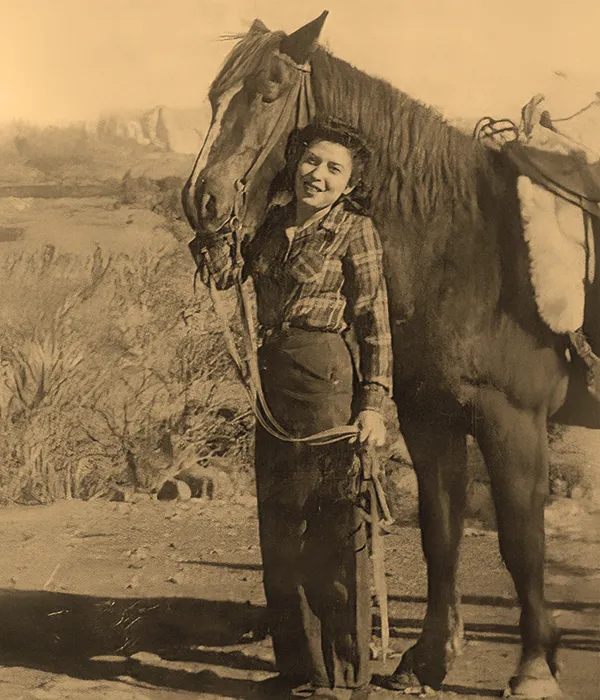

Dora Chavez Madrid (1922–2022) was a remarkable woman whose life intertwined with Sedona, Arizona’s history, reflecting the resilience and contributions of its early Hispanic settlers. Born Dora Chavez on December 27, 1922, in Flagstaff, Arizona, she was a descendant of one of the oldest Hispanic families in the Southwest, with roots tracing back to the Chavez and Armijo clans who settled in Oak Creek Canyon in the late 19th century. Her family’s legacy is tied to the rugged landscapes of Northern Arizona, where they were among the pioneering homesteaders who shaped the region’s early community alongside figures like J.J. Thompson and Abraham James. Dora’s story, though less documented than some of Sedona’s more prominent figures, embodies the spirit of perseverance and service that defined the area’s formative years.
Raised in Flagstaff, Dora grew up in a family steeped in the traditions of ranching and hard work. Her father, part of the Chavez lineage, worked the land, and her early life was marked by the simplicity and challenges of rural Arizona. During World War II, she contributed to the war effort as a riveter on B-52 bombers, a role that showcased her strength and adaptability—skills she carried throughout her life. In Flagstaff, she trained as a cosmetologist, a trade that led her to meet Joseph L. Madrid, a soldier stationed nearby.
The couple married and moved to Los Angeles, where they adopted two children, David and Deborah, building a family rooted in love and encouragement. Dora’s nurturing nature extended beyond her home; she later earned a Certified Nursing Assistant (CNA) certificate, dedicating herself to caregiving—a calling that echoed her community-oriented upbringing.
Dora’s connection to Sedona deepened in her later years. After her husband’s death in 2000, she returned to Arizona, settling in Prescott in 1993 to be closer to her pioneer roots. Her family’s historical ties to Sedona, including the Chavez Ranch Road named for her kin, kept her linked to the red rock country. From the 1990s until her health declined, Dora served as a living bridge to Sedona’s past, consulting freely with the Sedona Heritage Museum. Her encyclopedic knowledge of the area’s history—spanning its ranching days, early settlers, and Hispanic heritage—enriched the museum’s efforts to preserve the stories of Oak Creek Canyon’s founding families. She shared tales of the Chavez and Armijo households, who were integral to the social fabric of Red Rock, the mid-point community between Indian Gardens and the Verde Valley, where the first school and cemetery were established in the 1890s.
Beyond her historical contributions, Dora remained active in her community. In Prescott, she prepared meals for Sacred Heart Catholic Church, reflecting her faith and commitment to service. Her life came full circle in Arizona, where she passed away on February 7, 2022, at age 99, leaving behind a legacy celebrated by her son David in Indialantic, Florida, daughter Deborah in Prescott, and grandsons Daniel and David. Her story gained artistic recognition in The Dead Quilters Society, a 2024 musical dramedy premiered at the Sedona Heritage Museum, where she was portrayed by Dev Ross alongside other Sedona luminaries like Marguerite Staude and Katie Lee. The production highlighted her role in the interwoven fabric of Sedona’s history, honoring her as a pioneer whose quiet strength helped shape the region.
Dora Chavez Madrid’s life reflects the unsung contributions of Sedona’s Hispanic pioneers. While she didn’t live in Sedona full-time, her family’s deep roots and her later engagement with its heritage cemented her place in its narrative. From riveting warplanes to preserving history, she embodied the grit and generosity of Arizona’s early settlers, her memory enduring in the red rock landscape she loved.